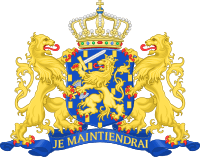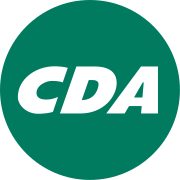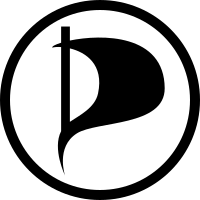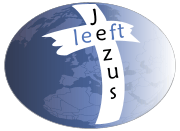List of political parties in the Netherlands
This article lists political parties in the Netherlands, which has a multi-party system with numerous political parties, in which any one party has little chance of gaining power alone, and parties often work with each other to form coalition governments.
The lower house of the legislature, the House of Representatives, is elected by a national party-list system of proportional representation. There is no threshold for getting a seat, making it possible for a party to get a seat with only two-thirds percent of the vote—roughly one seat for every 67,000 votes.
No party has won a majority of seats since the election of 1894[1], and no party has even approached the seats needed for a majority since the current proportional representation system was implemented in 1918. All Dutch governments since then have been coalitions between two or more parties. However, there is a broad consensus on the basic principles of the political system, and all parties must adjust their goals to some extent in order to have a realistic chance at being part of the government.
General overview
 |
|---|
| This article is part of a series on the politics and government of Netherlands |
|
|
Local government
|
|
Related topics |
- The People's Party for Freedom and Democracy (VVD) is a conservative-liberal party.[2] As a centre-right movement, it attaches great importance to private enterprise, economic liberalism[3] and the freedom of the individual in political, social, and economic affairs. The party is generally supportive of European economic integration, but is less supportive of political integration. The party's leader is Mark Rutte. VVD is a member of the Liberal International and Alliance of Liberals and Democrats for Europe Party.
- The Labour Party (PvdA), a social democratic party, and centre-left in orientation.[2] Its program is based on more social, political, and economic equality for all citizens. Former PvdA-prime minister Joop den Uyl has called it an "equal distribution of knowledge, income and power." In recent years the PvdA has espoused a centrist Third Way programme. The PvdA is generally supportive of European integration. Although called the Labour Party, it has no formal links to the trade unions. In practice, however, strong links exist, with PvdA politicians often beginning their careers in the FNV trade union. The party is led by Lodewijk Asscher. The PvdA was a member of the Socialist International until it delisted in 2014.[4]
- The Party for Freedom (PVV) is a right-wing populist[2] and national-liberal[5] party. It was founded by Geert Wilders, who split from the VVD in 2004. The PVV seeks to lower taxation. It is Eurosceptical and seeks to limit immigration, especially from Islamic and non-Western countries.
- The Christian Democratic Appeal is a Christian democratic party on the centre to centre-right.[2] It supports free enterprise and holds to the principle that government activity should supplement but not supplant communal action by citizens. On the political spectrum, the CDA sees its philosophy as standing between the "individualism" of the VVD and the "statism" of the Labour Party. The CDA favours European economic, cultural, and political integration. The party is led by Sybrand van Haersma Buma. The CDA is a member of the Centrist Democrat International.
- The Socialist Party (SP) is a left-wing populist party.[6] In the 1970s and 1980s, it was a Maoist party supported by the People's Republic of China (PRC). But in 1991 the SP dropped its Communist course, and chose a more independent and less radical democratic socialist[2] course, having long since denounced Maoism and the PRC. The party itself has called it a move "from socialism to a social-ism." The party opposes what it sees as the European Superstate. The SP operates as an independent party within the European United Left–Nordic Green Left in the European Parliament. Lilian Marijnissen is the leader of the SP.
- GreenLeft combines green politics[2] with left-wing ideals. The party was founded in 1989 as a merger of the Radical, Pacifist, Communist, and Evangelical Left parties. It is led by Jesse Klaver. GreenLeft is a member of the Global Greens.
- The Christian Union (CU) is a socially conservative[2] Christian democratic party, which mostly concentrates on ethical issues, such as a resistance against abortion, euthanasia, and gay marriage. In other areas (e.g. immigration and the environment), the party often is closer to the left-wing parties. It is sceptical about European integration. The CU operates within the European Conservatives and Reformists group within the European Parliament and is a founding member of the European Christian Political Movement. Gert-Jan Segers leads the party.
- Democrats 66 (D66) has had widely fluctuating electoral fortunes since the party's founding in 1966. It is a centrist social liberal[2][3] party, professing a pro-European platform of ethnic and religious tolerance. Rob Jetten leads the party. D66 is a member of the Liberal International.
- Party for the Animals (PvdD) is an animal rights party, which can be labeled as a one issue-party, though it claims not to be. The focus of the party is on animal welfare, protecting the environment and conservation. The party also has distinctive points of view about education, privacy, health care and the economy. Its founder is Marianne Thieme. Its current leader is Esther Ouwehand.
- The Reformed Political Party (SGP) is a party of the Christian right,[2] with stronger ethical points of view than the ChristianUnion. Although a small party on a national level, it is an important political power in some orthodox reformed municipalities. The party sees governments (local, regional, national and international) as unconditional servants of God. The party bases all of its views directly on the Bible. The party opposes European integration and operates within the European Conservatives and Reformists group and is a member of the European Christian Political Movement. Kees van der Staaij leads the SGP.
- 50Plus (50+) is a Pensioners' Party. It was led by Henk Krol who left the party in May 2020 due to internal quarrel. He then started the Party for the Future.[7]
- Denk, a small political party mainly focusing on and promoting multiculturalism and social integration. The party also supports environmentalism and international justice. Tunahan Kuzu founded the party after splitting from the PvdA in 2014.
- Forum for Democracy, a right-wing, national conservative party. In favour of lower taxes, military investment and expansion, electoral reform, offering a referendum on European Union membership, reinstating border controls and ending what it perceives as mass immigration. The party was founded and is led by Thierry Baudet.
- The Independent Senate Group (OSF) is a parliamentary party in the Dutch Senate with one senator, representing several provincial parties.
Parliamentary parties
Other national parties
Regional parties
| Party | Abbreviation | Active in | Number of provincial seats | Number of municipal seats | |
|---|---|---|---|---|---|
| Frisian National Party | FNP | Friesland | 4 | 58 | |
| Groninger Belang | GB | Groningen | 3 | - | |
| Party for the North | PvhN | Groningen | 1 | 3 | |
| Party for Zeeland | PVZ | Zeeland | 1 | 1 | |
Locally represented parties
| Party | Abbreviation | Year of creation | Number of municipal seats | |
|---|---|---|---|---|
| The Greens | DG | 1983 | 1 | |
| Islam Democrats | ID | 2006 | 2 | |
| New Communist Party of the Netherlands | NCPN | 1992 | 3 | |
| Forza! Netherlands | Forza! | 2003 | 8 | |
| Proud of the Netherlands | TROTS | 2007 | 6 | |
| United Communist Party | VCP | 1999 | 5 | |
| United Senior Party | VSP | 2001 | 13 | |
Defunct parties

- Algemeen Ouderen Verbond (AOV, General Elderly Alliance)
- Algemeene Bond van RK-kiesverenigingen (General League of Roman Catholic Caucuses; became the RKSP)
- Alliantie voor Vernieuwing en Democratie (Alliance for Renewal and Democracy)
- Artikel 50 (Article 50; merged with For the Netherlands)
- Algemeene Nederlandsche Fascisten Bond (General Dutch Fascist League)
- Anti-Revolutionaire Partij (ARP, Anti-Revolutionary Party, 1879–1980; merged into Christen Democratisch Appèl, CDA)
- Arab European League (Arabisch-Europese Liga, AEL; initially founded in Belgium, active in the Netherlands between 2003 and 2005; now MDP)
- Arbeiderspartij van Nederland (APN, Workers Party of the Netherlands)
- Boerenpartij (BP, Farmers' Party)
- Bond Christen Socialisten (BCS, League of Christian Socialists)
- Bond van Nederlandse Marxisten-Leninisten (BNML, League of Dutch Marxist-Leninists; merged into the KAO)
- Bond van Vrije Liberalen (Association of Free Liberals; merged into Liberale Staatspartij)
- Brabant Party (Brabantse Partij, active in North Brabant)
- Continue Directe Democratie Partij (CDDP)
- Centrumdemocraten (CD, Centre Democrats; split from the Centrumpartij)
- Centrumpartij (CP, Centre Party; later Centrumpartij '86)
- Centrumpartij '86 (CP'86; Centre Party '86)
- Christen Democratische Partij (Christian Democratic Party)
- Christelijk-Democratische Unie (Christian-Democratic Union; CDU; merged into Partij van de Arbeid (PvdA))
- Christelijk-Historische Unie (CHU) (Christian-Historical Union; merged into Christen Democratisch Appèl (CDA))
- Christelijk Sociale Party (CSP)
- Christelijk-Historische Kiezersbond (CHK) (Christian Historical Voters' League; merged into the Christelijk-Historische Partij)
- 'Christelijk-Historische Partij (CHP) (Christian Historical Party; merged into the Christian Historical Union)
- Christian Organisation of Self-employed Persons
- Communistische Partij Nederland (CPN) (Communist Party Netherlands; merged into GroenLinks, some members formed the NCPN)
- deConservatieven (The Conservatives)
- Democratisch Socialisten '70 (DS'70) (Democratic Socialists '70)
- Duurzaam Nederland (Sustainable Netherlands)
- Economische Bond (EB) (Economic League)
- Europa Transparant (ET) (Europe Transparant)
- Evangelische Volkspartij (EVP) (Evangelical Peoples Party; merged into GroenLinks)
- Fatherland League (Netherlands) (Vaderlandsch Verbond)
- Friesche Bond (Frisian League; merged into the Christian Historican Union
- Gereformeerd Politiek Verbond (GPV) (Reformed Political Union; merged into ChristenUnie)
- Hervormd Gereformeerde Staatspartij {dissolved in 1946}
- Independent Socialist Party (OSP)
- Islamitische Partij Nederland (Islamic Party Netherlands; founded in 1998)
- Katholieke Nationale Partij (KNP) (Catholic National Party) {merged into the KVP}
- Katholieke Volkspartij (KVP) (Catholic People's Party) {merged into Christen Democratisch Appèl (CDA)}
- Kommunistische Arbeidersorganisatie (marxistisch-leninistisch) (KAO(ml) (Communist Workers Organisation (Marxist-Leninist); dissolved around 1980)
- Kommunistische Eenheidsbeweging Nederland (marxistisch-leninistisch) (KEN(ml); Communist Unity Movement of the Netherlands) {dissolved in mid-1980s)
- The Independent Citizen Party (Dutch: Onafhankelijke Burger Partij, OBP)
- Leefbaar Nederland (LN) (Liveable Netherlands)
- Liberale Staatspartij (LSP; Liberal State Party; merged into Partij van de Vrijheid (PvdV))
- Liberale Partij (Liberal Party; merged into the Vaderlandsch Verbond)
- Liberale Unie (Liberal Union; merged into Liberale Staatspartij)
- Lijst Pim Fortuyn (LPF) (Pim Fortuyn List; disbanded in 2007)
- Lijst Ratelband (Ratelband List)
- Lijst Veldhoen (Veldhoen List)
- Marxistisch-Leninistische Partij Nederland (MLPN; a fake party founded in 1970 by the Dutch Intelligence Service BVD and the CIA, to research support for Maoism and to fool the People's Republic of China)
- Middenpartij voor Stad en Land (MPSL) (Middle Party for City and Country)
- Middenstandspartij (MP) (Middle Class Party)
- Moslimpartij (Muslim Party; founded in 1993)
- Nationaal-Socialistische Nederlandsche Arbeiderspartij (NSNAP) (National Socialist Dutch Workers Party) {1931–1941}
- Nationale Alliantie (NA) (National Alliance)
- Nederlands Blok (NB) (Dutch Block)
- Neutrale Partij (Neutral Party)
- Nieuwe Nationale Partij (NNP) (New National Party)
- Nieuw Rechts (NR) (New Right)
- O O Den Haag (O O The Hague; {was initially registered for 2003 elections but withdrew)
- Pacifistisch-Socialistische Partij (PSP; Pacifist-Socialist Party; merged into GroenLinks)
- New Limburg Party (PNL; Partij Nieuw Limburg, has been active in Limburg)
- Partij van de Vrijheid (PvdV) (Freedom Party; became Volkspartij voor Vrijheid en Democratie")
- Partij Voor De Mens en alle overige aardbewoners
- Partij voor Naastenliefde, Vrijheid en Diversiteit (Party for Neighborly Love, Freedom and Diversity; PNVD)
- Partij voor Rechtvaardigheid, Daadkracht en Vooruitgang (Party for Justice, Action and Progress)
- Plattelandersbond (Peasants' League)
- Politieke Partij Radicalen (PPR) (Political Party of Radicals; merged into GroenLinks)
- Progressive Integration Party
- Radicale Bond (RB) (Radical League; merged into VDB)
- Reformatorische Politieke Federatie (RPF) (Reforming Political Federation) {merged into ChristenUnie}
- Roomsch-Katholieke Staatspartij(RKSP) (Roman Catholic Political Party; predecessor of KVP)
- Senioren 2000 (Seniors 2000)
- Solide Multiculturele Partij (SMP)
- Sociaal-Democratische Arbeiders Partij (SDAP) (Social Democratic Workers Party; merged into Partij van de Arbeid (PvdA))
- Sociaal-Democratische Bond (Social Democratic League; merged into the SDAP)
- Sociaal Liberale Partij (SLP) (Social Liberal Party)
- Socialistische Party (Socialist Party active before World War II, not the current Socialist Party)
- Solidair '93 (Solidarity '93; appears not to have contested elections after 1998)
- Unie 55+ (General Senior Union/Union 55+)
- Verbond tot Democratisering der Weermacht (Alliance for the Democratization of the Army)
- Verbond van Communisten in Nederland (VCN) (League of Communists in the Netherlands; split from the Communist Party of the Netherlands (CPN) in 1983 and merged with the remains of the CPN in 1992 to form the New Communist Party of the Netherlands (NCPN))
- Verbond voor Nationaal Herstel (Alliance for National Reconstruction)
- Vrijzinnig Democratische Bond (VDB) (Freethinking Democratic League; merged into Partij van de Arbeid (PvdA))
- Vrij Antirevolutionaire Partij (Free Anti Revolutionary Party; merged into Christelijk-Historische Partij)
See also
- Politics of the Netherlands
- List of political parties by country
- Liberalism in the Netherlands
- Socialism in the Netherlands
- Christian democracy in the Netherlands
- Republicanism in the Netherlands
References
- Dieter Nohlen & Philip Stöver (2010) Elections in Europe: A data handbook, p1412 ISBN 978-3-8329-5609-7
- Wolfram Nordsieck. "Parties and Elections in Europe". Retrieved 8 June 2015.
- Almeida, Dimitri. "Liberal Parties and European Integration" (PDF).
- Moreau, Patrick. The Victorious Parties - Unity in Diversity?. The Extreme Right in Europe: Current Trends and Perspectives. Vandenhoeck & Ruprecht. p. 106.
- Andeweg, R. B.; Galen A. Irwin (2002). Governance and politics of the Netherlands. Basingstoke: Palgrave Macmillan. p. 51. ISBN 0333961579.
- https://www.ad.nl/politiek/henk-krol-verlaat-50plus-start-met-partij-voor-de-toekomst~a02a5a35
- Andeweg, R. and G. Irwin Politics and Governance in the Netherlands, Basingstoke (Palgrave) p.49
- T. Banchoff (28 June 1999). Legitimacy and the European Union. Taylor & Francis. p. 123. ISBN 978-0-415-18188-4. Retrieved 26 August 2012.
- Andeweg R.B. and G.A. Irwin Government & Politics in the Netherlands 2002 Palgrave p. 48
- "Vvd.nl Website Information". Who.is. Archived from the original on 15 May 2014. Retrieved 17 March 2017.
- Hans Keman (2008), "The Low Countries: Confrontation and Coalition in Segmented Societies", Comparative European Politics, Taylor & Francis, p. 221
- Sean Lusk; Nick Birks (2014). Rethinking Public Strategy. Palgrave Macmillan. p. 168. ISBN 978-1-137-37758-6.
- "VVD Standpunten". VVD.
- Barbara Wejnert (26 July 2010). Democratic Paths and Trends. Emerald Group Publishing. p. 28. ISBN 978-0-85724-091-0. Retrieved 20 August 2012.
- Thomas Poguntke; Paul Webb (21 June 2007). The Presidentialization of Politics: A Comparative Study of Modern Democracies. Oxford University Press. p. 158. ISBN 978-0-19-921849-3. Retrieved 24 August 2012.
- Pauwels, Teun (2014). Populism in Western Europe: Comparing Belgium, Germany and The Netherlands. Routledge. pp. 117–118. ISBN 9781317653912.
- Merijn Oudenampsen (2013). "Explaining the Swing to the Right: The Dutch Debate on the Rise of Right-Wing Populism". In Ruth Wodak, Majid KhosraviNik, Brigitte Mral. Right-Wing Populism in Europe: Politics and Discourse. A&C Black. p. 191.
- Tjitske Akkerman (2015). Gender and the radical right in Western Europe: a comparative analysis of policy agendas.
- Jan Rovny (2013). Where do radical right parties stand? Position blurring in multidimensional competition. Cambridge University.
- Are Dutch voters really turning to populist Geert Wilders?
'Dutch voters choose a new government in March 2017 and if the polls are right, the right-wing Freedom Party (PVV) of populist leader Geert Wilders is surging ahead of his rivals and is set to win 35 seats'.
BBC NEWS. Author - Anna Holligan.
Published 9 December 2016. Retrieved 10 December 2016. - Thompson, Wayne C. (2014). Western Europe 2014. Rowman & Littlefield. p. 185. ISBN 9781475812305.
- "Colloquium Vrijheid". Colloquiumvrijheid.eu. Archived from the original on 18 March 2016. Retrieved 3 April 2016.
- "Europe's right-wing parties meet near Vienna, urge Brexit". DW.COM. 17 June 2016. Retrieved 17 March 2017.
- "CDA: partij van samenleving en van waarden" (in Dutch). Reformatorisch Dagblad. 8 August 2015. Retrieved 27 December 2016.
- http://tradebridgeconsultants.com/country-index/netherlands/political-parties/christian-democratic-appeal/
- "Archived copy". Archived from the original on 16 October 2016. Retrieved 13 December 2016.CS1 maint: archived copy as title (link)
- http://nos.nl/artikel/332339-cda-kiest-voor-radicale-midden.html
- http://www.nrc.nl/nieuws/2012/01/21/cda-moet-kiezer-weer-raken-met-keuze-voor-radicale-midden
- "Netherlands". Freedom House. 2003. Retrieved 29 June 2019.
- Bremmer, Ian (13 September 2012). "Going Dutch: The Netherlands' election results roll in". Foreign Policy. Retrieved 29 June 2019.
- Syuzanna Vasilyan (2009). "The integration crisis in the Netherlands: the causes and the new policy measures". In Ditta Dolejšiová; Miguel Angel García López (eds.). European Citizenship in the Process of Construction: Challenges for Citizenship, Citizenship Education and Democratic Practice in Europe. Council of Europe. p. 73. ISBN 978-92-871-6478-0.
- Hans Vollaard; Gerrit Voerman; Nelleke van de Walle (2015). "The Netherlands". In Donatella M. Viola (ed.). Routledge Handbook of European Elections. Routledge. p. 171. ISBN 978-1-317-50363-7.
- Kees Van Kerbergen; André Krouwel (2013). "A double-edged sword! The Dutch centre-right and the 'foreigners issue'". In Tim Bale (ed.). Immigration and Integration Policy in Europe: Why Politics – and the Centre-Right – Matter. Routledge. pp. 91–92. ISBN 978-1-317-96827-6.
- Vít Hloušek; Lubomír Kopeček (2010). Origin, Ideology and Transformation of Political Parties: East-Central and Western Europe Compared. Ashgate Publishing, Ltd. p. 109. ISBN 978-0-7546-9661-2. Retrieved 14 July 2013.
- Dimitri Almeida (2012). The Impact of European Integration on Political Parties: Beyond the Permissive Consensus. Routledge. p. 98. ISBN 978-0-415-69374-5.
- https://nos.nl/artikel/2254034-rob-jetten-nieuwe-fractievoorzitter-d66.html
- "parties-and-elections.de".
- "Van poppodia naar de bedrijfskantine - Klaver wil van GroenLinks brede volkspartij maken".
- "De ideologische herprofilering van GroenLinks: na 28 jaar de gehoopte doorbraak?".
- http://www.demsoc.org/2014/05/11/greenleft-gl/
- Josep M. Colomer (24 July 2008). Comparative European Politics. Taylor & Francis. p. 221f. ISBN 978-0-203-94609-1. Retrieved 13 July 2013.
- Score 4.0/10 in 2003 Chapel Hill expert survey, see Hooghe et al. (2003) Chapel Hill Survey
- José Magone (3 July 2013). Contemporary European Politics: A Comparative Introduction. Routledge. p. 533. ISBN 978-1-136-93397-4.
- http://www.parties-and-elections.eu/netherlands.html
- "European Social Survey 2012 - Appendix 3 (in English)" (PDF). European Science Foundation. 1 January 2014. Retrieved 6 May 2014.
- Watkins, Susan (May–June 2005). "Continental tremors". New Left Review. New Left Review. II (33).CS1 maint: ref=harv (link)
- "Contemporary Far Left Parties in Europe", published November 2008, retrieved November 18, 2016: http://library.fes.de/pdf-files/id/ipa/05818.pdf
- Introducing the Dutch Socialist Party. Socialist Party (Netherlands). Retrieved 15 June 2017.
- Rudy B. Andeweg; Galen A. Irwin (2014). Governance and Politics of the Netherlands (4th ed.). Palgrave Macmillan. p. 74.
- Jort Statema; Paul Aarts. Timo Behr; Teija Tiilikainen (eds.). The Netherlands: Follow Washington, Be a Good European. Northern Europe and the Making of the EU's Mediterranean and Middle East Policies. note on p. 237.
- (in Dutch) CU is niet meer 'christelijk-sociaal' Trouw
- "Parties and Elections in Europe". Parties-and-elections.eu.
- "Far-right MEPs form group in European Parliament". EurActiv. 2 July 2009. Retrieved 20 March 2014.
- Score 8.0/10 in 2003 Chapel Hill expert survey, see Hooghe et al. (2003) Chapel Hill Survey
- Benjamin LeRuth; Yordan Kutiyski; André Krouwel; Nicholas J Startin (2017). "Does the Information Source Matter? Newspaper Readership, Political Preferences and Attitudes Toward the EU in the UK, France and the Netherlands". In Manuela Caiani; Simona Guerra (eds.). Euroscepticism, Democracy and the Media: Communicating Europe, Contesting Europe. Palgrave Macmillan UK. p. 105. ISBN 978-1-137-59643-7.
- Andreas KouwenhovenHugo Logtenberg 10 februari 2017. "Nep-aanhang is online actief voor politieke partij Denk - NRC". Nrc.nl. Retrieved 11 March 2017.
- "A Pro-Immigrant Party Rises in the Netherlands". The New York Times. 29 July 2016.
- "Dutch party wants to outlaw mosques, Islamic schools, Koran". Politico.
- "Ethnic minorities desert Labour, turn to Denk ahead of March vote". Dutch News. 6 February 2017.
- https://www.bewegingdenk.nl/wp-content/uploads/2016/11/Verkiezingsprogramma_DENK_2017-2021.pdf
- "Standpunten" (in Dutch). Forum voor Democratie. 15 November 2016. Retrieved 27 December 2016.
- "Forum voor Democratie: Why has the Dutch far right surged?". Al Jazeera. Retrieved 10 May 2020.
- "Forum voor Democratie: why has the Dutch far right surged?". Tilburg University. Retrieved 10 May 2020.
- Joshua Chaffin (14 March 2017). "Populists seize the moment as Dutch fall out of love with EU". Financial Times.
- "'We zijn de luis in de pels, houden iedereen scherp'" (PDF) (in Dutch). De Kanttekening. Archived from the original on 3 March 2017. Retrieved 9 May 2020.
- https://www.oneworld.nl/lezen/politiek/democratie/de-linkse-waakhond-van-amsterdam/. Retrieved 9 May 2020. Missing or empty
|title=(help) - "Verkiezingsprogramma 2017 – 2021" (in Dutch). Libertarische Partij. 10 November 2016. Archived from the original on 27 December 2016. Retrieved 27 December 2016.
- "Standpunten (FAQ)". GeenPeil (in Dutch). Retrieved 20 December 2016.
- Piratenpartij (13 April 2010). "Structuur" [Structure] (in Dutch). Retrieved 14 April 2010.
- Piratenpartij (13 April 2010). "Kernpunten" [Key Positions] (in Dutch). Retrieved 14 April 2010.
- NU.nl (12 April 2010). "Piratenpartij wil naar vrije informatiesamenleving" [Pirateparty wants a free information society] (in Dutch). Novum. Retrieved 14 April 2010.
- "Principles 3.2" (PDF). Archived from the original (PDF) on 19 February 2009. Retrieved 12 July 2014.
- "Doelstellingen" (in Dutch). Partij voor Mens en Spirit. 5 May 2016. Retrieved 27 December 2016.
- "Monasch: Ik ben sociaal-democraat en dat blijf ik". Trouw (in Dutch). 8 November 2016. Retrieved 27 December 2016.
- "Uitgangspunten" (in Dutch). Nieuwe Wegen. 30 November 2016. Archived from the original on 28 December 2016. Retrieved 27 December 2016.
- "Vision". Volt Europa. Retrieved 11 May 2019.
- Leadership and Lijsttrekker (top candidate) pending on possible leadership election
External links
- Documentation Centre for Dutch Political Parties (DNPP) at University of Groningen
- verkiezingsuitslagen.nl Dutch All Elections result according to the Dutch government
_Logo.svg.png)

_Logo.svg.png)
_Logo.svg.png)

_Logo.svg.png)







